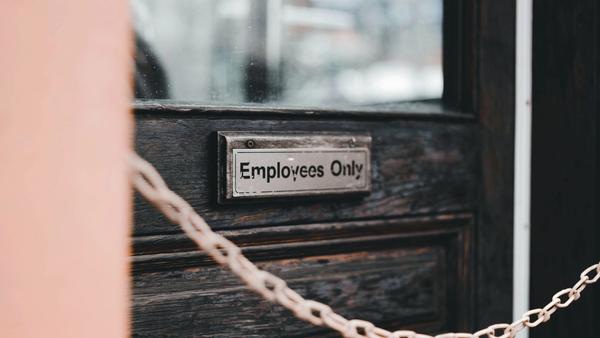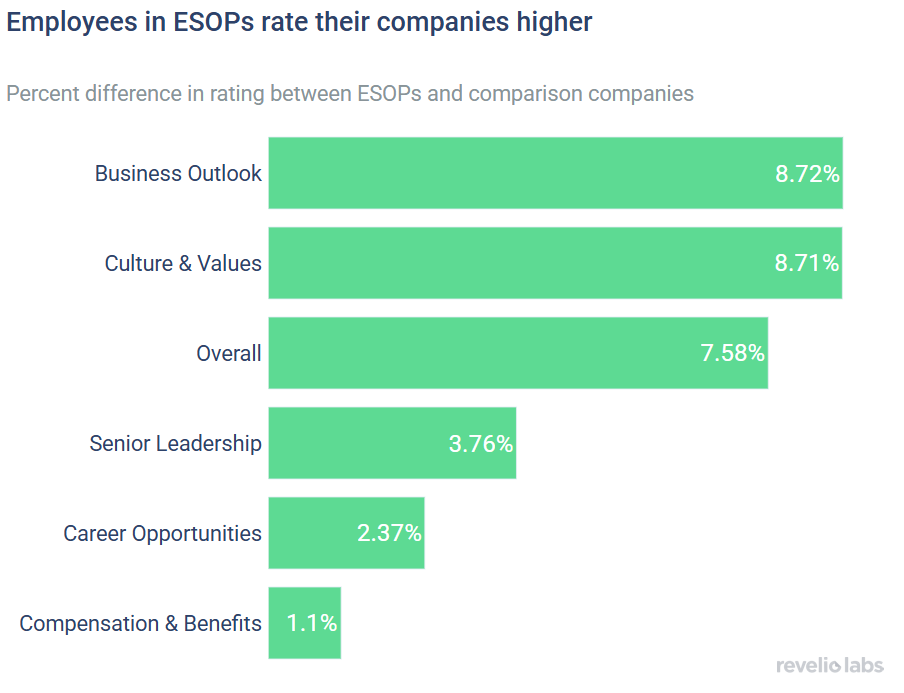In the Workplace, Full Stake Leads to Fuller Satisfaction
The case for Employee Stock Ownership Plans

100% employee-owned companies, structured through Employee Stock Ownership Plans (ESOPs), give workers a full stake in the company's success and are especially common in the Engineering and Construction, and the retail sectors.
Employees at 100% worker-owned companies report higher sentiment across all categories, particularly regarding business outlook, culture, and company values. However, concerns about long work hours and work-life balance are common.
ESOP companies see slightly higher employee retention rates and more internal promotions than their counterparts, as ownership fosters long-term commitment and investment in the organization’s success.
Employee ownership is a key benefit that allows workers to share in the financial success of the companies they help build. It provides a sense of ownership and alignment between employees and the organization’s long-term goals, often resulting in increased job satisfaction, retention, and productivity. There are various forms of employee ownership, each with its own structure and benefits. One common model is the Employee Stock Ownership Plan (ESOP), where a company sets up a trust fund through which employees acquire shares after meeting certain employment criteria. ESOPs provide tax benefits to both the company and the employees and offer a way for companies to retain employees by repurchasing shares when they leave or retire.
Other forms of employee ownership include equity compensation plans, such as stock options or employee stock purchase plans, which require employees to purchase shares, and do not come with the same tax advantages as ESOPs. Worker cooperatives, the least common type of employee ownership in the U.S., are more prevalent in European countries. In a worker cooperative, employees not only own the business but also participate in the decision-making process, with each member having one vote. While worker cooperatives often consist of smaller companies, ESOPs have become popular in larger, established firms, and this newsletter focuses on their impact on employee satisfaction, retention, and internal promotions.
In this newsletter, we focus on companies that are 100% employee-owned through Employee Stock Ownership Plans (ESOPs). These companies stand out because their entire ownership structure is held by employees, empowering them with a stake in the company's success. Notably, large, well-known ESOPs like Publix Supermarkets are excluded, as significant ownership by the Jenkins family makes them a hybrid model rather than a fully employee-owned.
Over one-third of 100% employee-owned companies are in the Engineering and Construction services sector. Examples of such companies include HDR, Black & Veatch Holding Co., HNTB, and Rosendin Electric. Additionally, many employee-owned companies are in the Retail and Consumer Goods industry. Notable examples in the food sector include WinCo Foods and Brookshire Grocery, with Houchens also recognized as a prominent player in the field. ESOPs companies range from large companies (such as HDR that employs almost 13,000 people) to mid-sized firms with 1000 to 5000 employees.


One of the most notable side effects of employee ownership is increased employee satisfaction. When comparing employees in 100% ESOP companies to those similar-sized companies within the same industry, the results are clear—employees at ESOPs report higher levels of sentiment across all dimensions. The most significant differences are seen in employee sentiment regarding business outlook, culture, and company values, where ESOP employees express significantly stronger positive sentiment.


While employee sentiment around compensation and benefits in ESOP companies is generally higher than the industry average, it shows the smallest difference compared to other areas. This is potentially due to the fact that a large share of ESOP employees’ total compensation is realized when the trust fund buys back their shares upon their departure from the company. Overall, while compensation and benefits may not be the most distinguishing factor in ESOP companies, the structure still provides employees with significant long-term financial incentives that contribute to overall job satisfaction.
Zooming into the review text left by employees at ESOP companies, we uncover several key insights. Employees consistently express appreciation for employee ownership through ESOPs, citing these as significant benefits. They also highlight the positive company culture and the opportunities for growth and involvement. However, despite these advantages, employees frequently mention concerns about long hours, work-life balance, overtime, and the nature of the work—particularly in industries like construction and retail.

Does employee ownership help with employee retention? The data suggests that, over time, ESOP companies tend to have higher retention rates compared to their counterparts in similar industries. This is likely because the ownership stake in the company aligns employees' interests with the long-term success of the business. As employees accumulate shares over time, their financial stake in the company grows, creating a stronger incentive to stay with the company and see it succeed. Additionally, employee ownership can foster a deeper sense of loyalty and engagement, as employees are not just workers, but also stakeholders in the company's future. This sense of ownership may lead to a more committed workforce that is less likely to leave for other opportunities.


Another key aspect of employee ownership in ESOP companies is the higher likelihood of internal promotions, particularly to senior management roles. Employees at ESOP companies tend to see more opportunities for upward mobility within the organization, as a larger proportion of senior managers are promoted from within. This can be attributed to the culture of employee ownership, where individuals are more likely to be invested in the long-term success of the organization and are recognized for their commitment and expertise. Moreover, promoting from within helps maintain continuity of values and culture, which is particularly important in employee-owned companies. This internal promotion culture not only boosts employee morale but also enhances retention by providing clear pathways for career advancement.


While ESOP companies offer clear benefits such as increased employee satisfaction, higher retention, and stronger internal promotion rates, there are also areas for improvement. Companies looking to implement or refine an ESOP structure should focus on strengthening their company culture, aligning employees’ interests with the long-term success of the business, and offering opportunities for growth. However, attention must also be paid to balancing the demands of work, particularly in industries like construction and retail, where long hours and work-life balance are recurring concerns. By addressing these factors, companies can maximize the positive impact of employee ownership, ensuring both employee well-being and business success.


